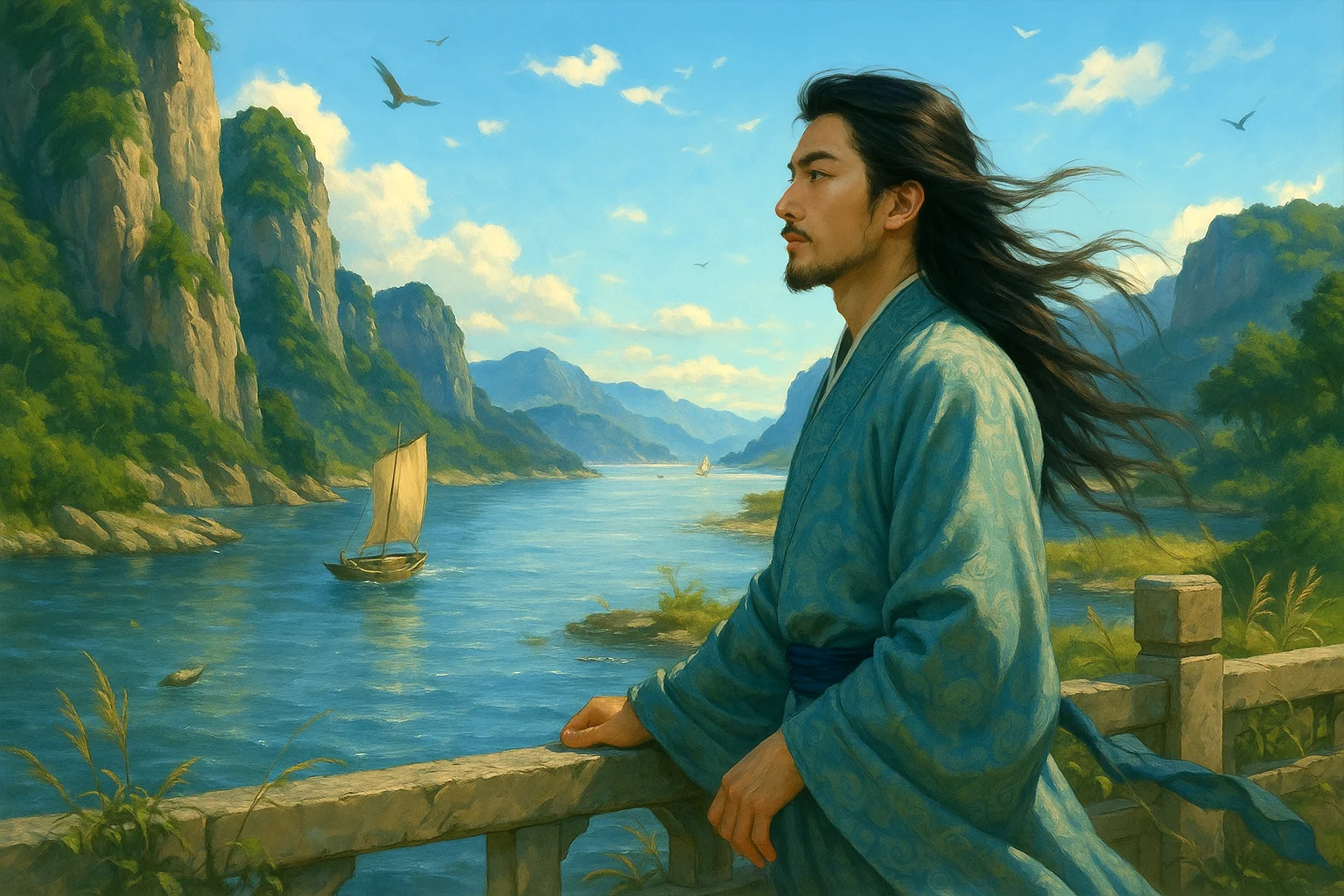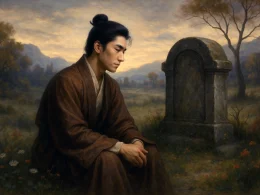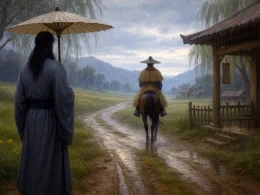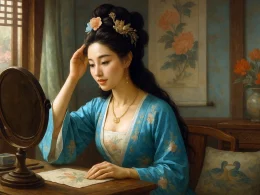Twin peach blooms blush deeper at dusk’s call,
Peeping through bamboo by my window tall.
They must have trailed celestial scribes to earth,
To grace this scholar’s court with heaven’s mirth.
Original Poem
「南乡子 · 送述古」
回首乱山横,不见居人只见城。
谁似临平山上塔,亭亭,迎客西来送客行。归路晚风清,一枕初寒梦不成。
苏轼
今夜残灯斜照处,荧荧,秋雨晴时泪不晴。
Interpretation
Composed in July 1074 during Su Shi's tenure as Hangzhou's deputy magistrate, this cí bids farewell to his dear colleague Chen Xiang (styled Shugu). When Chen was reassigned to Shangqiu (southern capital), Su Shi accompanied him to Linping Mountain's foothills before writing this lyrical meditation on separation. The work's brilliance lies in transforming a single backward glance into an enduring portrait of friendship's spatial and emotional geography.
First Stanza: "回首乱山横,不见居人只见城。"
Huíshǒu luàn shān héng, bújiàn jū rén zhǐ jiàn chéng.
Turning back—chaotic ridges bar the way, / No trace of my friend, only distant walls.
The opening establishes visceral dislocation: "chaotic ridges" (乱山) embody emotional turmoil, while the vanished "trace" (不见居人) makes absence tangible. The city's lingering silhouette becomes a cruel placeholder for the departed companion.
"谁似临平山上塔,亭亭,迎客西来送客行。"
Shuí sì Línpíng shān shàng tǎ, tíngtíng, yíng kè xī lái sòng kè xíng.
What rivals Linping's pagoda—so erect, / Greeting western arrivals, seeing departures east?
Here, the watchtower becomes an eternal witness, its steadfastness ("so erect") mocking human transience. The directional contrast ("west"/"east") maps friendship's spatial rupture onto cosmic coordinates.
Second Stanza: "归路晚风清,一枕初寒梦不成。"
Guīlù wǎn fēng qīng, yī zhěn chū hán mèng bù chéng.
Homeward path: night wind purifies, / On chilled pillows, dreams refuse to form.
The journey back amplifies solitude. "Purifies" (清) carries ironic weight—the wind cleanses traces of companionship, while "chilled pillows" (初寒) materialize emotional void as physical sensation.
"今夜残灯斜照处,荧荧,秋雨晴时泪不晴。"
Jīnyè cán dēng xié zhào chù, yíngyíng, qiū yǔ qíng shí lèi bù qíng.
Tonight's guttering lamp casts slanted light— / Flickering. Rain clears, but never these tears.
The finale achieves sublime pathos: the "guttering lamp" (残灯) mirrors dwindling hope, while the meteorological pun ("rain clears"/"tears never") crystallizes inconsolable grief. Su Shi's genius shines in making weather both literal and metaphorical—nature's cycles highlighting human sorrow's permanence.
Holistic Appreciation
This lyric poem, composed upon bidding farewell to his old friend Chen Xiang, expresses Su Shi’s deep appreciation for friendship and his profound loneliness after parting. The first stanza focuses on the moment of farewell, blending scene and emotion seamlessly. The poet uses the mountain pagoda as an emotional anchor, conveying boundless reluctance. The second stanza shifts to the solitude and sleeplessness upon returning home, where the flickering lamp, autumn rain, and tearful eyes intensify the sentiment, culminating in the poignant line "yet tears remain unceasing"—an endless depth of feeling.
The emotional arc moves from daytime parting to nighttime solitude, from external sights to inner reflections. With tender strokes, Su Shi paints the lingering melancholy of separation, making this poem a masterpiece that combines classical elegance with heartfelt sincerity.
Artistic Merits
- Scene-Emotion Fusion, Mutual Resonance
Mountains, pagodas, rain, and lamps—inanimate objects—are imbued with emotion, intertwining with the poet’s thoughts to create an artistic effect where "scenery embodies feeling, and feeling mirrors scenery." - Personification and Contrast
The first stanza personifies the mountain pagoda, amplifying the poet’s sorrow; the second contrasts the ceased autumn rain with unending tears, heightening emotional intensity. This technique of "using the unfeeling to depict the feeling" is powerfully evocative. - Concise Language, Profound Imagery
Despite its brevity, the poem unfolds with clarity and emotional richness. Vivid details like "towering" (亭亭), "glimmering" (荧荧), and "tears unceasing" (泪不晴) create striking visual and poetic impact, showcasing Su Shi’s artistic mastery.
Insights
The deepest emotions often reside not in grand declarations but in quiet details—night rain, a dying lamp, a solitary shadow. Life’s meetings and partings are inevitable, yet Su Shi transforms them into poetic philosophy: profound feelings may dwell in scenery; unspeakable farewells find voice through the brush. This poem reminds us to cherish fleeting yet genuine connections and, amid life’s flux, to hold fast to the bonds that matter.
About the Poet

Su Shi (苏轼, 1037 - 1101), a native of Meishan in Sichuan, was a polymath of the Northern Song literary world. His prose was expansive and unrestrained, his poetry fresh and vigorous, and his ci poetry pioneered the bold and unconstrained style. In calligraphy, he created the "Su Style," and in painting, he championed "spiritual resonance," earning him a place among the "Four Masters of the Song." Despite repeated political persecutions—most notably the "Poetry Case of the Black Terrace"—his exile to Huangzhou, Huizhou, and Danzhou yielded timeless masterpieces. Lu You praised him as "the literary patriarch of an era."












